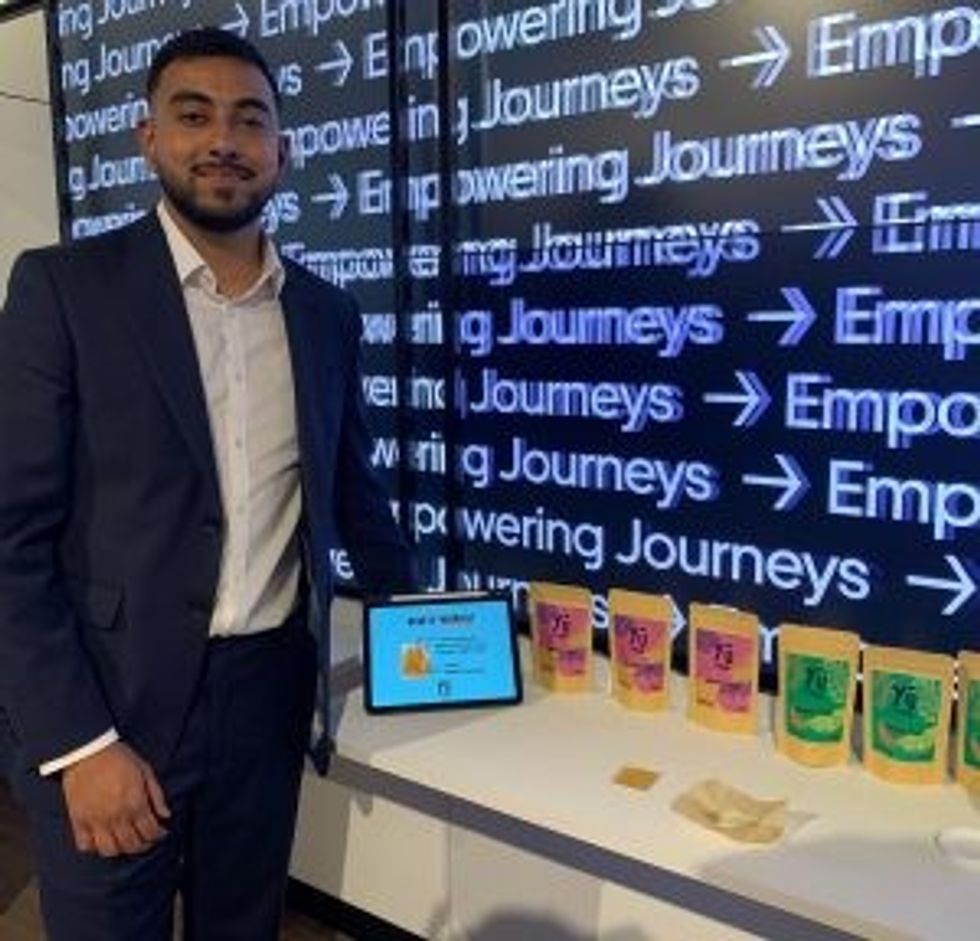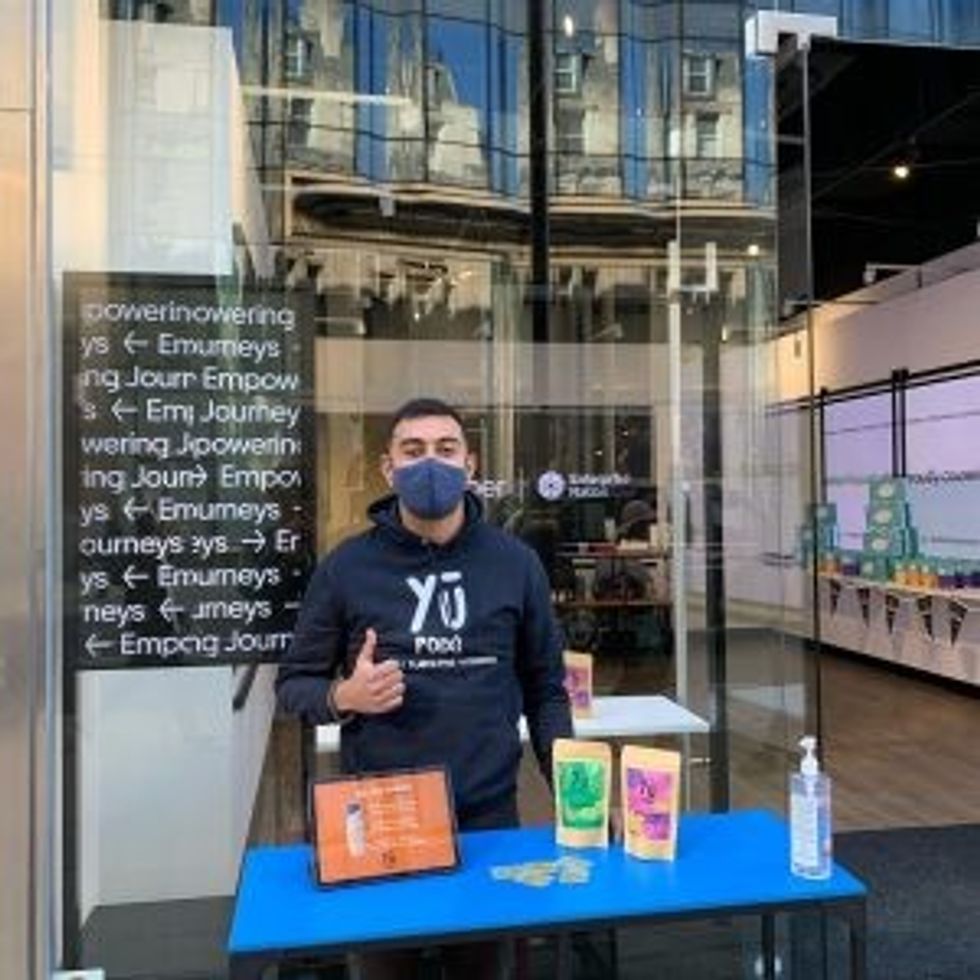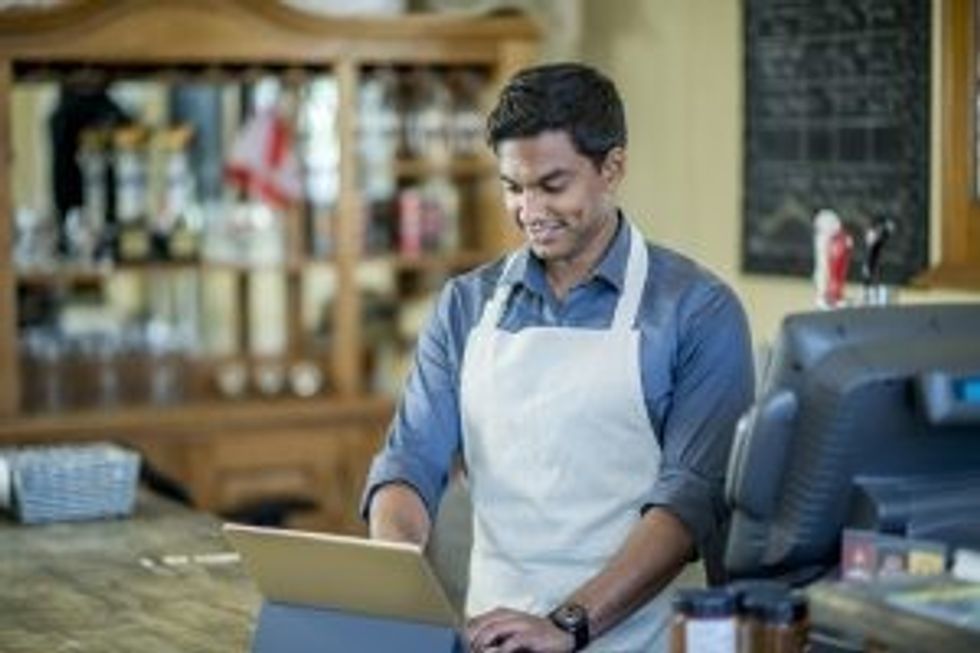Mastercard’s new programme will help small and micro businesses with digital tools
MICRO and small businesses are the engine that drives the UK economy – collectively, they create more than half of the nation’s businesses’ combined revenue and employ more than two in five people.
As Britain recovers from the pandemic, it will come as no surprise therefore that the success of these micro and small businesses is vital for our local and national economy. And to help such businesses, Mastercard’s Center for Inclusive Growth has set up a programme called Strive UK, to empower British entrepreneurs to thrive in the digital economy, build financial resilience and improve growth prospects.
Nawfal Rajbusseea (pictured, left) of YŪ PODS and Aadit Shankar of Atcha are just two business owners that Strive UK seeks to help reach their potential.
YŪ PODS are single-use shampoo (with conditioner) or bodywash pods that dissolve when in contact with water; the idea was conceived two years ago and Nawfal began operations in March this year.
“Our product was designed to be fully functioning, high-quality shampoo and bodywash while simultaneously eliminating the need for any plastic. We are solving a huge problem with plastic waste,” he said.
At the beginning of 2021, YŪ PODS as a company began to take the steps to move forward. However, due to Covid-19 restrictions at the time, Nawfal said they struggled to gather essential information and were unable to communicate with potential suppliers.
“As a result, we suffered severe project delays. However, with perseverance, we were able to utilise online tools for information and began to build relationships with other suppliers still operating in the difficult circumstances. This benefitted us in the long run as we became better equipped at handling tough situations,” he said.
A recent Mastercard/Cebr report – Striving to Thrive – found that among small business owners 41 per cent believe their company would not have survived without digital tools and 47 per cent believe technology will become more important to their company’s success over the next five years.
Around a third say technological adoption has led to increased turnover and increased profit.
Mastercard president for UK and Ireland, Kelly Devine, said, “Small business owners told us they hope to achieve a collective £827 billion in growth over the next five years, but this won’t happen without support, particularly when it comes to digital tools which have been so integral during the pandemic.”
Strive builds on Mastercard’s $250 million commitment to support micro and small businesses globally over the next five years.
In collaboration with Enterprise Nation, Digital Boost and Be the Business, Strive UK will help small and micro businesses grow – while empowering local communities and supporting an inclusive post pandemic recovery. It is designed to complement existing government initiatives such as the Help to Grow Digital scheme which helps small businesses with more than five employees access grants to pay for technology. But many businesses in the UK have fewer than five employees so wouldn’t qualify for the scheme, or wouldn’t know which technology to spend the grants on.
By leveraging Mastercard’s global network and local partnerships and working with small businesses that have the highest propensity for growth, the programme aims to deliver impact at scale and help ensure the UK’s economic recovery is sustainable and inclusive.
One of the businesses that Strive UK seeks to help is Aadit Shankar’s Atcha, a food brand which includes salads, sandwiches and rice bowls that are “nourishing and energising”.
Made with fresh ingredients, the business was founded two and half years ago, and Aadit now helps run three kitchens and a ready-meal wholesale business.
“We are a small team of 15, but with big plans,” he said. “We’re on a mission to be the go-to place for healthy Indian food in the UK.”
When lockdown measures were in place last year, like many small businesses, Aadit too faced a tough challenge.
He said, “As a healthy food brand, we were heavily dependent on the office/commuter lunch market. Losing that overnight was tough. The overall effect on revenue was a drop of around 30 per cent from March to April 2020; previously, we were seeing monthly growth of 30 - 50 per cent.
“However, as our operations were focused on delivery (to offices), we were able to pivot fairly effectively to home delivery through the use of online tools. We opened in the evenings and weekends and launched a ready-meal business to try to get our food into new local convenience stores and delis that were opening across London.”
Aadit said his business benefited from grants from Enterprise Nation (which is working with Strive UK) as well as some local and central government programmes. As a result, revenues trebled from May to September last year and Atcha opened a second site.
Technology “absolutely helped us to improve productivity”, Aadit said.
He added that the business runs on Whatsapp and noted how they have “dozens of active groups for communicating with suppliers, customers, delivery drivers, engineers, landlords, and investors”.
Longer term, Atcha will partner “with a food-tech brand that will help us to manage inventory better and reduce waste”.
YŪ PODS’ owner Nawful said, “Going forward, one of the biggest challenges my company is facing is finalising the manufacturing process as we are aiming to secure B-corp status, as this adds a few layers of complexity. However, this will allow us to demonstrate to our consumers and retail partners the benefits of using YŪ PODS.
“I believe more government grant schemes are required to encourage environmental innovations in all industries – this would help young people with industry disrupting ideas to make it a reality and overall, this will help the UK government reach its 25-year environmental plan targets.”
According to him, one of the main pressures of being an ethnic minority business owner is the “heavy expectations on my shoulders to be successful with my company.
“For ethnic minorities, especially in the Asian community, failure is not an option or is looked down upon. I would say, ignore anyone that attempts to put you down this way, you are on a different path that they may not understand. You just need to keep persevering, continue learning and give your all - the results will eventually show.
“Challenges are part of the journey, so I take it all in my stride.”
YŪ PODS entered numerous competitions in 2021 and were successful in some, and unsuccessful in others.
Aadit said Atcha was “lucky to be in London where there is an amazing investor network and so many organisations offering loans and grants”.
Rather, for him, the challenge is deciding when the right time is to take on capital, and what for.
“Although we rely on tech, we are an operating business. We have needed to get our business model to make sense from day one, and so we are keen to use any capital we raise for marketing and site expansion, rather than cash burn.”
Ventures such as Atcha and YŪ PODS will benefit from Strive UK which will directly support businesses with under ten employees through data-driven tools, training and services which can help build their resilience and enable them to not only grow but thrive.
Digital tools, upskilling and face-to-face networking for the minority ethnic and female-led businesses across the UK are among initiatives that will help accelerate the shift for micro and small businesses.
Mastercard’s Devine said, “Micro and small businesses are the lifeblood of the UK economy, but for many business owners, the pandemic has had a devastating impact.
“Now more than ever before, small businesses need access to support and resources that will empower them to thrive in the post-pandemic economy. Strive has been set up to deliver exactly this, and we are excited to supercharge the success of micro and small businesses across the country through this programme.”




















